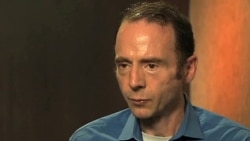When AIDS was first identified in the 1980s, it was considered a death sentence. The advent of powerful triple-drug therapy transformed it into a chronic disease. Now, researchers say a child may have been cured of HIV infection Experts are cautious about making too much of a single case. But the news has them talking with unprecedented optimism that if caught early, at least some patients could be saved from a lifetime of infection.
Tim Brown is one of only two people ever to be considered cured of HIV infection. But it was not easy. He also had leukemia. A bone marrow transplant from a donor with a rare mutation cured his HIV.
“The first transplant went well," said Brown. "But the second one was pretty horrible. And I wouldn’t wish what I went through on my worst enemy.”
The latest case, at the University of Mississippi, was different. A baby born to an untreated HIV-positive mother was given a combination of anti-AIDS drugs within hours of birth. The patient has not been identified.
The therapy itself was not unusual, says Dr. Paul Volberding of the University of California at San Francisco.
“The treatment was really just regular antiretroviral therapy, HIV drugs," said Volberding. "So in contrast to the first reported cure, this is one that has a lot broader potential implications.”
That means that the early and aggressive treatment the child received may rid the body of the virus before it can take hold. If the results hold up to scrutiny, it’s significant, says Harvard School of Public Health professor Richard Marlink.
“It’s a big deal to show that, if we really hit the virus hard right at birth, perhaps, for those babies that might be getting infected at that early time in their life, we may be able to eliminate the virus from their system," said Marlink.
The impact could be especially great in sub-Saharan Africa, where most of the roughly 300,000 children born with HIV each year reside.
Marlink says it could save lives, as well as eliminate the burden of lifelong therapy.
“We wouldn’t have to be treating them the rest of their life," he said. "They wouldn’t have the toxicity the rest of their life and the cost the rest of their life of being on treatment.”
Researchers today are talking not just about treating but curing HIV infection. It’s a remarkable turn of events for veterans of the epidemic.
“Unbelievable a few years ago," said Volberding. "And we wouldn’t have done it with any sense of optimism at all. And I think now, we’re still pretty realistic about it. We know it’s not around the corner, but there’s at least a critical mass, we hope, of research now being conducted.”
They hope that research will pay off with cures for adults with HIV as well as children.
Tim Brown is one of only two people ever to be considered cured of HIV infection. But it was not easy. He also had leukemia. A bone marrow transplant from a donor with a rare mutation cured his HIV.
“The first transplant went well," said Brown. "But the second one was pretty horrible. And I wouldn’t wish what I went through on my worst enemy.”
The latest case, at the University of Mississippi, was different. A baby born to an untreated HIV-positive mother was given a combination of anti-AIDS drugs within hours of birth. The patient has not been identified.
The therapy itself was not unusual, says Dr. Paul Volberding of the University of California at San Francisco.
“The treatment was really just regular antiretroviral therapy, HIV drugs," said Volberding. "So in contrast to the first reported cure, this is one that has a lot broader potential implications.”
That means that the early and aggressive treatment the child received may rid the body of the virus before it can take hold. If the results hold up to scrutiny, it’s significant, says Harvard School of Public Health professor Richard Marlink.
“It’s a big deal to show that, if we really hit the virus hard right at birth, perhaps, for those babies that might be getting infected at that early time in their life, we may be able to eliminate the virus from their system," said Marlink.
The impact could be especially great in sub-Saharan Africa, where most of the roughly 300,000 children born with HIV each year reside.
Marlink says it could save lives, as well as eliminate the burden of lifelong therapy.
“We wouldn’t have to be treating them the rest of their life," he said. "They wouldn’t have the toxicity the rest of their life and the cost the rest of their life of being on treatment.”
Researchers today are talking not just about treating but curing HIV infection. It’s a remarkable turn of events for veterans of the epidemic.
“Unbelievable a few years ago," said Volberding. "And we wouldn’t have done it with any sense of optimism at all. And I think now, we’re still pretty realistic about it. We know it’s not around the corner, but there’s at least a critical mass, we hope, of research now being conducted.”
They hope that research will pay off with cures for adults with HIV as well as children.





